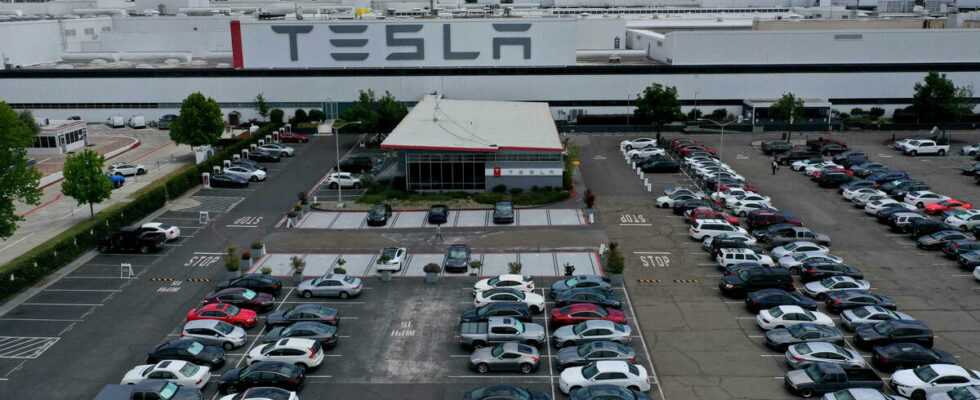Two months after a California state agency filed a racial discrimination complaint against Tesla, the testimonies are piling up. In an edifying investigation, the Los Angeles Times talks about three former black employees of the firm, who describe what the American newspaper describes as “culture of racism”. Their stories are part of the lawsuit filed Feb. 9 by the California Department of Fair Employment and Housing on behalf of more than 4,000 current and former black workers at the auto company. Which represents “the largest racial discrimination lawsuit ever brought by the state”, remind him LA Times.
Racist insults in English or Spanish, black employees who worked in separate areas, dismissals when they complained… The list of grievances against the powerful American firm is documented by the testimonies at the LA Times by Monica Chatman, Kimberly Romby and Nigel Jones. Accounts disputed by Tesla, the firm ensuring that the three workers had not complained of racism to management and that the sanctions they received were the result of their behavior at work. “Race plays no role in Tesla’s work assignments, promotions, compensation or discipline, say the company’s lawyers. Tesla prohibits discrimination in any form.
“Modern Day Slavery”
Tesla is “modern-day slavery”, yet asserts Monica Chatman. This single mother, who entered the factory in Fremont, California, at the age of 32, first reports that her boss ordered her to do the work of several. “I said to him, ‘Are you telling me to do the work for four people on my own?’ His words were, ‘Do the job or you lose your job. African-American workers were routinely given the toughest jobs, “the work that no one wanted to do”, she summarizes. Chatman also says that after she passed out on her cart, she asked to go home to recuperate but would then have been threatened with dismissal.
Racism was also the norm in words. Latin American and white workers and their leaders regularly used the word “Negro”. “It was the norm, it was the tradition of Tesla”, she says to LA Times, adding that while she has not heard Asian workers use this racist word, some of them “made jokes about the chicken”, a stereotype aimed at the supposed diet of black Americans. Monica Chatman says a boss said to a group of employees: “Monica and the niggers up there, they don’t give a damn. All they do is sit around all day.”
After an accident she causes and which shuts down the channel for several days, she is fired. “I had never had an accident in all these years, said Monica Chatman. But they expected me to make a mistake.” In a statement seen by the LA Times, Tesla said his dismissal stemmed from the incident, which represented a “serious breach of security”. Tesla denies the working conditions described by the ex-employee but did not wish to communicate to the newspaper the time cards, the HR complaints or the personal files of Monica Chatman.
“Plantation” and “slave ship”
“I wanted to be part of the green energy movement. It was the future, a career that would take me far.” Kimberly Romby thought for her part when she arrived at the Fremont factory in 2017. But she became disillusioned after a few weeks, when two young Latin American colleagues allegedly started harassing her with racist but also homophobic insults, after ‘she mentioned being in a relationship with a woman. She complains to human resources, but she says she was then transferred to a more difficult position, where she had to lift up to 100 heavy packages a day. Alone, while non-black workers on this chain worked in pairs, she said, adding that only African Americans had to clean the factory when the chains were stopped.
The facts reported by Kimberly Romby actually describe a work organization where blacks and whites seem largely separated and treated differently. “Workers call Tesla’s factory ‘the plantation’ and ‘the slave ship,’ explains Kimberley Romby to the Times. Not only for the brutal pace of work there, but especially because black workers are regularly put in a corner of the factory which lacks air conditioning and where the employees are on top of each other.
“Blacklisted”
After three years in the army, Nigel Jones entered the Fremont factory in 2016. He was 22 years old. He reports having often heard chiefs use the word “Negro”. He decides to let it go, for fear of being fired for complaining. Nigel Jones is then promoted. “But when I went full-time, things started to go downhill very quickly,” he recalls, adding that he was not invited to the meetings, that his ideas were not taken seriously. Then a new boss arrives. In December 2017, the latter addressed him with a racist insult: “He walked away one time and said, ‘Oh, you lazy nigger.’ We looked at each other and were like, ‘What?
After complaining to human resources, he was fired. “They didn’t tell me why, just that I wasn’t a good employee for Tesla. Later, I found out it was for security and attendance violations, charges I never had a report for.” A colleague from another Tesla factory then explained to him that he had been “blacklisted” by the company, which declares for its part that it had no trace of “Jones having filed a race-based complaint while employed at Tesla”. Nigel Jones, who now runs a skateboard company he founded, is waiting for justice. His former boss at Tesla, who now works at another company, did not respond to requests from the LA Times.
